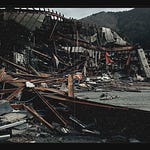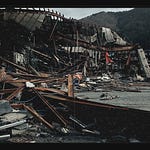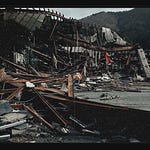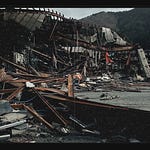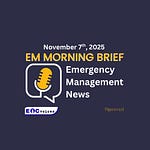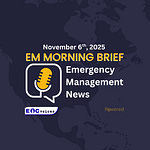
In this ever-evolving world, our societies are constantly being tested by emergencies and crises that shake the foundations of our security, stability, and prosperity. In such turbulent times, the efficacy of our responses and actions reveals the robustness of our preparations and the depth of our understanding of emergencies. Yet, I fear the lessons we just witnessed in Hawaii will be repeated. Hawaii is a stark reminder of our vulnerabilities and the pressing need to introspect and reform the system. The perils of assigning unqualified or ill-prepared individuals to roles pivotal to Emergency Management (EM) can't be underscored enough.
I want to draw your attention to a profound, complex problem that looms over many jurisdictions within the United States. We need only turn our gaze to the disheartening situation in Hawaii to understand the deep gravity of the matter. The sentiment I bring to you is a stark one: many of our jurisdictions are, in essence, merely one catastrophe away from facing a fate similar to that of Hawaii.
In several jurisdictions, retired first responders or politically connected individuals are hired for emergency management roles who need more training in emergency management's labyrinthine, multifaceted role. Many view this job as an easy “retirement” job (full disclosure: I also came from the first responder world 20 years ago.) and find it more complicated than they thought.
While the experience of first responders is undeniably invaluable, and they possess critical skills honed from years on the front, there is an underlying concern. This hiring trend has sometimes overshadowed truly dedicated emergency managers who have dedicated their careers to mastering the nuances of emergency management and are genuine EM professionals.
Emergency management professionals bring unique competencies and a comprehensive understanding of the field.
These hiring practices of taking marginally qualified who may have EM-adjacent careers raise questions about the long-term impact on the quality and effectiveness of emergency management programs.
I have long held and will argue today, that we are doing a tremendous disservice to our residents as public servants. How so? By the two cardinal sins in emergency management: firstly, by hiring ill-prepared individuals for the vast responsibilities they shoulder, and secondly, by relegating emergency management to a position of collateral duty.
In this context, collateral means that emergency management, rather than being a solid fixture in administrative responsibilities, has been dispersed thinly in a piecemeal fashion, diluting its importance. It has become a mere afterthought or an additional duty rather than a core function. This is deeply problematic in disaster management, where the well-being and lives of our citizenry hang in the balance. For jurisdictions to take a half-hearted approach, believing this is the right solution for the community's needs, is outrageous.
The hiring of unqualified individuals to roles of vital importance compounds this issue. Emergency management is a specialized field requiring an in-depth understanding of risk assessment, disaster response, logistics, communication, project management and more. Appointing someone without the requisite skills, experience, or passion is akin to asking a novice to pilot a commercial airplane: the results can be catastrophic.
It is not my intent today to cast aspersions or point fingers but rather to implore each and every one of us to acknowledge this pressing issue and commit to actionable solutions. We must re-evaluate and restructure our approach to emergency management. This includes providing rigorous training, investing in specialized personnel, and ensuring that the importance of this function is recognized at every echelon of our administrative structures.
To do anything less is to leave our communities vulnerable, to stand unprepared on the precipice of potential disaster. Today, Hawaii is a stark reminder of what can transpire when jurisdictions do not hire the most qualified individuals. Let us use this as a wake-up call, urging us towards action and an unwavering commitment to the safety and well-being of our residents.
Let's peel back the layers to truly understand the root causes of this alarming trend.
At the forefront is a disturbing misunderstanding of the role of emergency management. To the uninitiated, EM might appear as a sequence of reactive measures. It is a complex symphony of anticipation, planning, strategy formulation, and precise execution. However, limited by their peripheral understanding, many hiring authorities make the egregious error of overvaluing tangential qualifications while undermining the competencies paramount to EM.
Next, we cannot overlook the shadows of political influences that lurk in many EM appointments. This isn't merely an administrative concern but a moral and ethical one. When appointments pivot on political affiliations or pressures rather than genuine merit, we don't simply jeopardize professional standards; we imperil the communities we are duty-bound to safeguard.
There's also the unsettling tendency to devalue specialized education and training. Contrary to some misconceptions, EM isn't a generalized field. It requires as much specialization and training as medicine or engineering. Yet, there's a persistent myth that anyone with a semblance of administrative experience can seamlessly transition into EM. The results of such misconceptions can be devastating.
The ramifications of these systemic issues are manifold and severe. With poor decision-making at the helm, what could be manageable crises often spiral into uncontrollable disasters. We need not look further than the Lahaina fire incident to understand the dire consequences of inadequate preparation and understanding. Such events don't just lead to immediate destruction but also have lasting repercussions in the form of eroded public trust.
Over time, communities start viewing their protective institutions not as their shield but with skepticism, even disdain. Furthermore, the EM profession, which should be held in high esteem, starts to wane in its perceived value. A field that should epitomize expertise, preparation, and commitment becomes synonymous with inefficiency and negligence.
At this pivotal juncture, the path forward demands introspection and swift action.
A pivotal starting point is to emphasize the primacy of education. This endeavor transcends the confines of traditional academia. It's about fostering a culture where practitioners are deeply entrenched in both the theoretical frameworks and the practical difficulties of emergencies. This calls for a concerted effort from the EM community to advocate for rigorous educational programs and engage with educational institutions to ensure curriculum relevancy.
Promoting certification and professional standards is not just a procedural necessity but a moral imperative. By instituting and upholding universally recognized certification systems, we ensure standardized service delivery and offer aspiring EM professionals a clear and structured career trajectory.
Furthermore, we must hold hiring authorities accountable. Those responsible for filling EM roles must be cognizant of the profound consequences of their decisions. This extends beyond immediate outcomes and delves into the long-term trust and confidence communities place in their protective institutions.
Our collective mission in the Emergency Management community is unambiguous. We are at a defining moment in our profession's history. We have the choice to either persist in our current trajectory, marred by inadequacies and inefficiencies, or to rally together and elevate the standards and expectations of our field. Maui and numerous other cautionary tales must serve as our guiding lights, urging us to reform and strengthen. Our communities deserve the best; our solemn duty is to ensure they receive nothing less. Let us commit to forging a future marked by excellence, foresight, and unwavering dedication.







